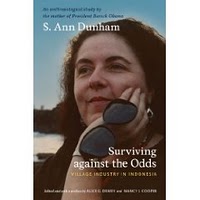
Last fall Duke University Press published the Ph.D. thesis of S. Ann Dunham, President Obama’s mother, who just happened to be an anthropologist. I can certainly sympathize with the editors, as my own dissertation also bordered on the 700 page level (which may be one reason it was never published as a book). Details on the book can be found at Duke University Press. But I attach here a valuable account by Michael Dove for the New York Times last August.
Dreams From His Mother
By Michael R. Dove, The New York Times, August 10, 2009
PRESIDENT OBAMA’s late mother, Ann Dunham Soetoro, was famous for the good cheer and optimism that she preserved in the face of a complex and challenging world. Her personality went hand-in-hand with her career as an anthropologist in Indonesia and Pakistan, where she studied and worked with village craftsmen, slum-dwellers and countless others. I knew Dr. Soetoro as a friend and colleague for many years before her death from cancer in 1995. Though I only met her son once, briefly at her memorial service, I’ve watched him as he’s taken on the hardest job in the world, and often found myself wondering how her worldview might have shaped him.
Dr. Soetoro’s most sustained academic effort was her 1,043-page dissertation, “Peasant Blacksmithing in Indonesia: Surviving Against All Odds,†completed in 1992 and based on 14 years of research. This was a classic, in-depth, on-the-ground anthropological study of a 1,200-year-old industry. Her principal field site was a cluster of hamlets, containing several hundred households, on an arid limestone plateau on Java’s south coast. There, village metalworkers produced dozens of different iron blades and tools for use in farming, carpentry and daily life.
When Dr. Soetoro began her study in 1977, the village could be reached only by walking a mile and a half from the nearest paved road. The first battery-powered television set did not arrive in the village until 1978, and was placed in a window and watched by the village en masse; electricity did not arrive until a decade later. In her dissertation, Dr. Soetoro called this village “a wonderful and mysterious place to live.â€
Running through Dr. Soetoro’s doctoral research, as through all her work, was a challenge to popular perceptions regarding economically and politically marginalized groups; she showed that the people at society’s edges were not as different from the rest of us as is often supposed. Dr. Soetoro was also critical of the pernicious notion that the roots of poverty lie with the poor themselves and that cultural differences are responsible for the gap between less-developed countries and the industrialized West.
Indeed, Dr. Soetoro found that the villagers she studied in Central Java had many of the same economic needs, beliefs and aspirations as the most capitalist of Westerners. Village craftsmen were “keenly interested in profits,†she wrote, and entrepreneurship was “in plentiful supply in rural Indonesia,†having been “part of the traditional culture†there for a millennium.
Based on these observations, Dr. Soetoro concluded that underdevelopment in these communities resulted from a scarcity of capital, the allocation of which was a matter of politics, not culture. Antipoverty programs that ignored this reality had the potential, perversely, of exacerbating inequality because they would only reinforce the power of elites. As she wrote in her dissertation, “many government programs inadvertently foster stratification by channeling resources through village officials,†who then used the money to further strengthen their own status.
These same observations also led her to start working with institutions like the Ford Foundation and the United States Agency for International Development to devise alternate pathways for reaching and working with the poor. She helped to pioneer microcredit programs that made small amounts of capital available to weavers, blacksmiths and other low-income groups — people who would otherwise have had no access to credit.
It’s worth pointing out that though microenterprise is fairly well-known today — and Indonesia now has one of the world’s largest microcredit programs — it was pretty radical stuff when Ann Soetoro was doing her work. But then, she had a habit of swimming against the current. While many American academics tried to avoid antagonizing the repressive Suharto government, Ann Soetoro called attention to those the regime had failed to benefit: the village craftsmen, the plantation workers and urban scavengers, the underpaid workers in the shoe and clothing factories.
There is a final lesson from her work that is worth remembering: No nation — even if it is our bitterest enemy — is incomprehensible. Anthropology shows that people who seem very different from us behave according to systems of logic, and that these systems can be grasped if we approach them with the sort of patience and respect that Dr. Soetoro practiced in her work.
The anthropologist Clifford Geertz wrote that “the aim of anthropology is the enlargement of the universe of human discourse.†This was clearly a central goal of Dr. Soetoro’s work and life. From an admittedly great distance, I can see those same values in her son.
Michael R. Dove is a professor of social ecology and anthropology at Yale.